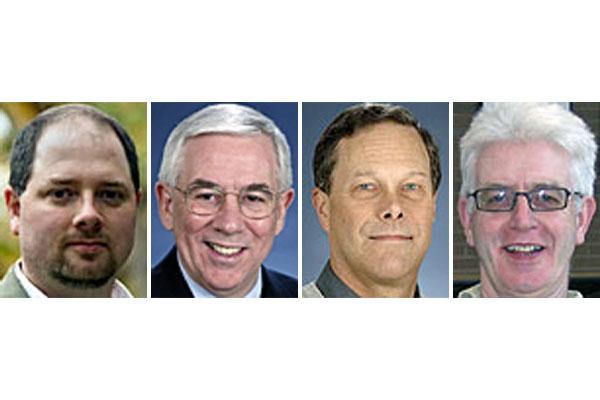Mershon affiliates win NSF grant for comparative elections study

Four Mershon Center faculty affiliates have received a $54,000 grant from the Directorate of Political Science in the National Science Foundation to conduct a post-election survey of the British electorate as part of a study comparing 2016 and 2017 elections in Britain, France, Germany, the United States and earlier studies of four countries in Southern Europe.
Principal investigators on the project, entitled “A Changing Electoral Politics in Western Democracies: Comparing the 2017 British Election to France, Germany, the United States, and Southern Europe within the Comparative National Election Study,” include Erik Nisbet, associate professor of communication; Paul Beck, Distinguished Professor Emeritus of Social and Behavioral Sciences; Richard Gunther, professor emeritus of political science, and Anthony Mughan, professor of political science and director of the International Studies Program.
Drawing from the same questionnaire used for 49 post-election surveys in 27 countries over the past three decades, the study will allow researchers to do a systematic comparative analysis of voting behavior across eight western democracies, at least three of which have undergone substantial party-system realignment in recent years.
The survey includes voters in the:
- June 2017 general election in Britain
- November 2016 presidential election in the United States
- May 2017 second-round presidential election in France
- September 2017 federal legislative election in Germany.
Results of this research will help explain fundamental challenges in recent years to established patterns of voting behavior and party structures in Western democracies by focusing on such factors as responses to economic stress, changing patterns in distribution of political information, demand for and satisfaction with democracy, and political polarization.
Additional insights regarding attitudes toward democracy will be gained by comparing these eight democracies with several less than fully democratic countries such as Turkey that have been surveyed in the last three years using the same questionnaire.
Project outcomes are expected to include:
- a book charting new patterns of electoral politics in western democracies and southern Europe
- papers and peer-reviewed publications analyzing the major factors impacting stability and change in party support in western democratic countries
- public release of the British dataset after an embargo period.
The study is part of the Mershon-funded Comparative National Elections Project (CNEP), a partnership among scholars who have conducted election surveys across the democratic world. Founded in the late 1980s, CNEP now includes 49 surveys from 1990 to 2016 in 27 different countries on 5 continents, with multiple election surveys in 13 countries. Additional surveys are planned for later in 2017 and 2018.
